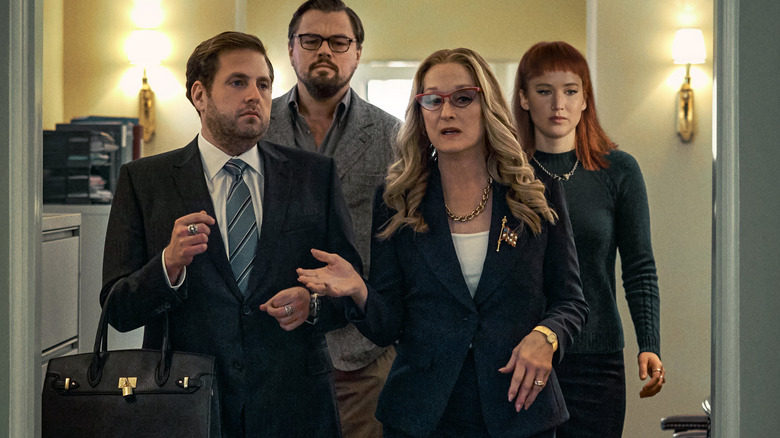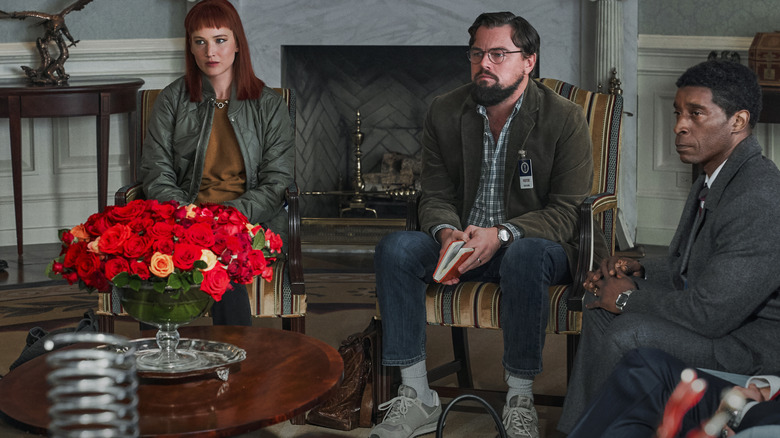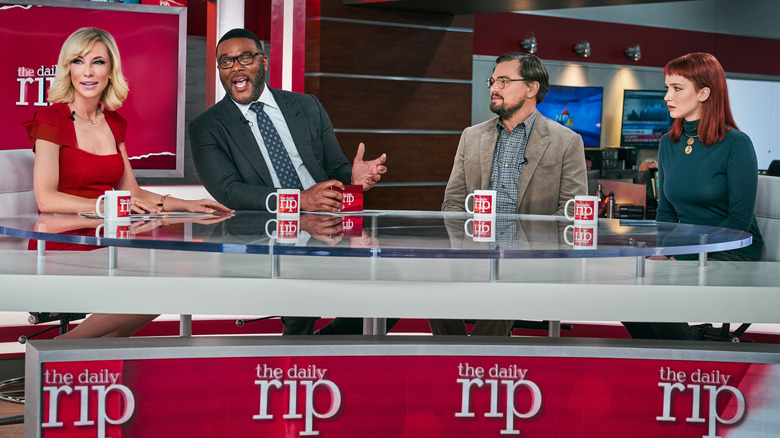Don't Look Up Ending Explained: It's The End Of The World As We Know It
Writer and director Adam McKay has made quite the mid-career transition, pivoting from his usual mode of crowd-pleasing (but deceptively clever) comedies, to more serious-minded films that function as vehicles for political commentary just as much as they provide laughs. It might be easy to believe that the same filmmaker could be credited for movies like "Anchorman: The Legend of Ron Burgundy," "Talladega Nights: The Ballad of Ricky Bobby," "Step Brothers," and "The Other Guys," but then things get a little more complicated with the additions of "The Big Short," "Vice," and now "Don't Look Up" in recent years. For his part, McKay has provided a solid reason for his shift away from a once-comfortable niche, explaining that, "The themes of those comedies were about sort of empty-suit white guys, and that's what Will [Ferrell] and I riffed on. That's what really made us laugh. But then you started to see the ravages of that culture, and it wasn't so funny anymore."
In many ways, "Don't Look Up" feels like the culmination of those steadily building feelings of shock and dismay at a world gone off the rails. The last few years alone have made it impossible to ignore a precipitous increase in political extremism, science denialism, and a pandemic on top of it all, providing plenty of fodder for this latest film — about an incoming comet on a collision course with Earth and two low-level scientists tasked with getting the word out to the world at large — to channel some very real, pent-up frustration with. Chris Evangelista's review for /Film, however, doesn't hold back in detailing the many missteps and misguided approaches that add up to a wildly uneven film. Is this a cathartic release to help us come to terms with the absurdity of everyday life, or a navel-gazing exercise in smug self-satisfaction? Regardless of where you personally land on it, the ending of "Don't Look Up" is still very much worth digging into for those who've seen the film, which is currently playing in select theaters ahead of its Netflix debut later this month.
Screaming Into the Void
"Don't Look Up" stars Leonardo DiCaprio as the neurotic and woefully in-over-his-head Dr. Randall Mindy and Jennifer Lawrence as fiercely uncompromising grad student Kate Dibiasky, the unwitting astronomer who initially stumbles upon the data indicating a new 5 to 10 kilometer-wide comet in the film's very first scene. The awe over her once-in-a-lifetime discovery quickly turns sour once Dr. Mindy crunches the numbers and calculates the exact trajectory of this planetary body — Earth. From that point on, it becomes a race against time (6 months and 14 days, to be precise) to notify a stubborn, ambivalent, and deeply fractured world of everyone's impending doom in the face of a genuine planet-killer.
To put the ending in proper context, it's important to note that these early stages of the film do lots of heavy-lifting to establish the darkly comedic tone and uncomfortably real satire on display, as Mindy and Dibiasky scramble to put on a brave face and find the right words to convince the White House of the very real and present danger. Unfortunately, their scientific expertise proves to be spectacularly useless against the sheer force of Meryl Streep's calculating celebrity politician, President Janie Orlean, who — you'll never believe it — is a thinly-veiled reference to the disastrous presidency of one Donald J. Trump. McKay lays on the farce pretty thick in these scenes, putting viewers through a seemingly endless array of riffs between President Orlean and her incompetent son and Chief of Staff, Jason (Jonah Hill) to ram home the idea that science, no matter how hard anyone tries, will only ever bounce off the impenetrable wall of bureaucracy until it becomes politically convenient to do otherwise.
Suffice to say, anyone who has ever watched HBO's "Chernobyl" (or, you know, current events during the last several years) will immediately — and repeatedly — realize what McKay is attempting to get across here.
Compromising Character
The prolonged middle act of "Don't Look Up" likely proves to be the make-or-break point for most viewers who may be left on the fence, as Dr. Mindy inexplicably finds himself a media darling and a lightning rod figure among the general public along the lines of Dr. Fauci. The marginalization of Dibiaski is presented for laughs and scathing social commentary in equal measure — the film wrings plenty of dry humor out of the idea that the one time a woman is properly credited with a huge discovery, of course that happens to be when her name is historically associated with an extinction-level event. Memes and misogyny swiftly follow while Mindy goes on to enjoy worldwide fame and the attention of renowned morning show host Brie Evantee (Cate Blanchett, doing her best Megyn Kelly impersonation). Dibiaski is further relegated to playing second fiddle in all matters concerning planetary defense, as she and NASA liaison Dr. Teddy Oglethorpe (Rob Morgan) become afterthoughts. Mindy, meanwhile, is paraded around in high-profile meetings and further compromises his own morals when it becomes clear that political agendas remain priority number one above all else.
As the comet draws nearer and nearer, viewers will either find humor in the increasingly broad, almost slapstick antics of the film's contingent of comet denialists ("Don't Look Up," naturally, becomes the basis of President Orleans' MAGA-like sloganeering campaign once the comet becomes visible to the naked eye in the skies above) ... or find themselves turned off completely by the never-ending (if no less accurate!) bleakness depicting how humanity would very likely react to such an existential threat to the survival of our species. By the time Mindy and Dibiaski join forces once more and are driven out of desperation to go on the offensive against Orleans, the damage is already done and the American government — with a crucial assist by the Elon Musk stand-in Peter Isherwell (Mark Rylance) — has already enacted plans to mine the comet for rare and valuable minerals as opposed to blowing it up.
Last Supper
Amid all the prior doom and gloom associated with McKay's efforts to turn "Don't Look Up" into a climate change parallel, a pandemic allegory, and an anti-Trump screed all at once, however, the final act of the film somehow turns itself around and achieves something almost (dare I say it) profound. The writing is on the wall the minute Isherwell convinces President Orleans to abandon the launch of the comet-destroying mission and instead pivot to the tremendously risky, yet absurdly lucrative scheme to mine it instead. With all other options thoroughly exhausted and the fate of the world in the hands of greedy hyper-capitalists, well, things predictably don't turn out well and the mission is rendered a catastrophic failure.
On the ground, our remaining characters try to find hope and comfort through whatever means are left to them. Dibiasky finds herself in the orbit of Timothée Chalamet's rambunctious and irrepressibly horny skater dweeb, named Yule, who actually contains quite a bit of heart underneath his (relatively) repelling exterior. Mindy returns home to Michigan to his estranged wife June (Melanie Lynskey), finally making up with his family after his mistake-prone media tour and bringing along all his colleagues for one last shared meal before the end. After more than two hours of suffocating, irony-drenched humor and a vaguely smug sense of being above it all, here's where the earnestness finally pokes through and lends a sorely-needed dose of meaning to it all.
As our characters gather at the Mindy household and the comet is making its final approach to Earth, their unassuming and refreshingly normal conversation around the table provides a sense of humanity that much of the rest of the film has lacked to this point. When the world is far past the point of no return, this scene seems to argue, we can at least find comfort among our loved ones and in the beauty of everyday things. Yule puts a poignant button on this thought with his stirring final prayer, confidently calling upon a higher power for dignity, hope, and humility in the face of a global cataclysm. This all occurs far too late to redeem the overall movie, but it'll be difficult to forget the final moments of this quiet, peaceful last supper and the terrifying death rattle of the Earth as the comet impacts and systematically wipes out life as we know it.



